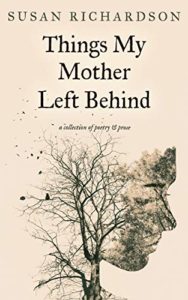In 2002, poet Susan Richardson was diagnosed with retinitis pigmentosa, a genetic disorder of the eye that eventually leads to blindness. It’s a disease inherited from parents; there is no cure. What she faced was a slow walk to darkness. A diagnosis like that can be devastating to a writer. Richardson’s response was to continue to write.
Her writing is focused in three areas: poetry, short fiction, and her blog, Stories from the Edge of Blindness. Her work has been published in numerous literary journals, both print and online, around the world. She’s received several awards and recognitions, and she’s built a social media presence on Twitter, Facebook, and Instagram.
And now she’s published a collection of 65 poems, Things My Mother Left Behind. The collection functions as something of a journal, a diary of progression toward darkness. She uses “darkness” instead of “blindness” because it’s a more apt description. Blindness implies one cannot see; darkness suggests that, even if physically blind, one can still see from the heart.
And see she does. There’s no self-pity or handwringing here; one suspects that would only get in her way. Instead, there’s a sense of “Yes, I know what’s happening, and I wish it wasn’t, but I’m getting on with my life, even if I still need to understand what happened.” These poems originate in an examined life, an understanding of who she is and what she’s living through. Richardson is using poetry to document that examination. Here’s what happens one morning.
Color Disappears

The glare of daylight brings darkness,
a flash that cleans slate and wipes color
from every surface.
I learn to rely on the clicks of heater gauges,
The labored breath of the chase.
I run,
Flat out,
As fast as my thick and aging legs
Will carry me.
I am caught every time,
the net widening,
the pitch black of midnight seeping
into the cracks of the sun.
Today, orange disappeared,
became shadows and ravens and fear.
Tomorrow may be the last time I ever see green.

Susan Richardson
Richardson writes about where she comes from, “the bones of peasants.” She describes the decline of her father, dealing with dementia and physical frailties (“He smiles and strokes my fifty-year-old hand, / all the years drifting away”). In the title poem, she speaks to what her mother has bequeathed to her, her “thumbprint behind my eye,” “her imprint on my hands,” and “her fingerprints on my adolescence,” among other things. And in these poems she tells her own life story, including a troubled childhood and adolescence.
The poems offer heartbreak, insight, self-acceptance, and more. Perhaps most of all, they subtly offer determination and strength. A weaker person would have collapsed long ago under the weight of progressive illness, a father’s deteriorating mind, and functioning in a sightless world.
Things My Mother Left Behind is a deep, arresting collection. You read these starkly honest and often jolting poems, and you find a poet, and a human, who’s something far more than a survivor.
- “Your Accent! You Can’t Be from New Orleans!” - October 9, 2025
- Poets and Poems: Donna Vorreyer and “Unrivered” - October 7, 2025
- Poet Sidney Lanier and the Lost Cause - October 2, 2025

Maureen says
To see, and then not. . .
Susan Richardson says
Hi Glynn! This is amazing! Thank you so much. I have been in the process of moving to Ireland and just now checked my email and found an email from River directing me to your review. I am so incredibly grateful.